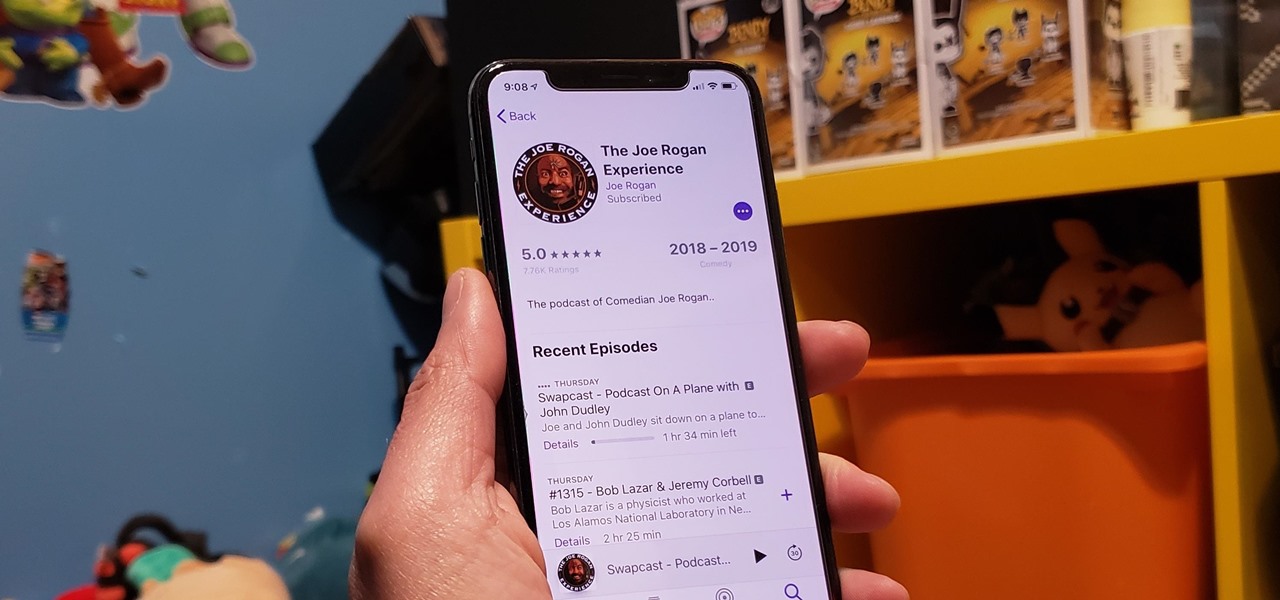Home>Events & Info>Podcast>How To Promote A Podcast


Podcast
How To Promote A Podcast
Published: December 13, 2023
Looking to promote your podcast effectively? Learn expert strategies and tips on how to grow your podcast audience and increase your reach.
(Many of the links in this article redirect to a specific reviewed product. Your purchase of these products through affiliate links helps to generate commission for AudioLover.com, at no extra cost. Learn more)
Table of Contents
- Introduction
- Choosing a Catchy Podcast Title
- Creating High-Quality Content
- Optimizing Episode Descriptions
- Submitting to Podcast Directories
- Leveraging Social Media Platforms
- Collaborating with Guests and Influencers
- Engaging with Your Audience
- Utilizing Email Marketing
- Networking and Cross-Promotion
- Implementing SEO Strategies
- Monitoring Analytics and Adjusting Strategies
- Conclusion
Introduction
Podcasts have exploded in popularity in recent years, offering a unique and convenient way for people to consume engaging content on various topics. As an aspiring podcaster, it is crucial to not only create compelling episodes but also to ensure that your podcast reaches the widest possible audience. This is where podcast promotion comes into play.
Effective promotion is essential to increase your podcast’s visibility, attract new listeners, and ultimately grow your audience. With so many podcasts out there, standing out and capturing listeners’ attention can be a challenge. However, by implementing strategic promotion tactics, you can maximize your podcast’s reach and build a devoted fanbase.
In this article, we will explore various strategies and techniques to help you promote your podcast effectively. From crafting catchy episode titles to optimizing your show’s description for search engines, we will cover all the essential steps you need to take to get your podcast noticed. So let’s dive in!
Choosing a Catchy Podcast Title
A podcast title is the first thing that potential listeners will see, so it plays a crucial role in attracting their attention. A catchy and intriguing title can make people curious about your podcast and entice them to click and listen. Here are some tips to help you choose a compelling podcast title:
- Be Clear and Concise: Your title should clearly and succinctly convey what your podcast is about. Avoid vague or generic titles that don’t give potential listeners a clear idea of what to expect.
- Be Unique: Stand out from the crowd by choosing a title that is memorable and distinct. Avoid generic titles that blend in with other podcasts in the same genre.
- Evoke Emotion or Curiosity: A great title captures the listener’s attention and sparks their curiosity. Consider using emotional or intriguing words that ignite interest and make people want to learn more.
- Include Relevant Keywords: Incorporating relevant keywords in your title can improve your podcast’s visibility in search engine results. Think about the words or phrases your target audience might use when searching for podcasts in your niche, and include them in your title.
- Keep It Memorable: A memorable title is more likely to stick in people’s minds and be shared with others. Consider using wordplay, alliteration, or rhymes to create a title that is catchy and easy to remember.
- Test It Out: Before finalizing your podcast title, test it out on a small group of people or through a focus group. Gather feedback and insights to ensure that your title resonates with your target audience and accurately represents your podcast’s content.
Remember, your podcast title is not set in stone. If you find that your initial title doesn’t resonate well with your audience or doesn’t accurately reflect your podcast’s content, don’t be afraid to rebrand and choose a new title. Continuously evaluating and refining your podcast’s title can help you attract a larger audience and increase your chances of success.
Creating High-Quality Content
In the competitive podcasting landscape, high-quality content is essential to attract and retain listeners. Producing engaging and valuable episodes will not only keep your existing audience interested but also help you attract new listeners through word-of-mouth recommendations. Here are some tips for creating high-quality podcast content:
- Plan Your Episodes: Before you start recording, take the time to plan your episodes. Create a clear outline or script that guides the flow of the conversation or storytelling. This will help you stay organized and deliver a cohesive episode.
- Choose Engaging Topics: Select topics that are relevant, interesting, and have the potential to resonate with your target audience. Consider conducting research to identify popular and trending topics within your niche.
- Bring on Knowledgeable Guests: Inviting expert guests or industry influencers to join your podcast can add valuable insights and diverse perspectives to your episodes. Collaborating with guests can also help you tap into their audience and expand your reach.
- Be Authentic: Show your personality and be genuine in your conversations. Listeners appreciate hosts who are authentic and relatable, so don’t be afraid to let your true self shine through.
- Balance Structure and Spontaneity: While it’s important to have a structured plan for your episodes, don’t be afraid to allow for spontaneity and organic conversations. Sometimes the best moments happen naturally.
- Invest in Good Equipment: High-quality audio is crucial for a professional and enjoyable listening experience. Invest in a good microphone, headphones, and audio editing software to ensure your episodes sound clear and polished.
- Edit and Polish: Take the time to edit your episodes, removing any filler words or awkward pauses. Editing also allows you to improve the overall flow and pacing of the episode.
- Provide Value to Your Audience: Think about what knowledge or value you can offer your listeners. Whether it’s sharing tips, insights, or entertaining stories, make sure your content is valuable and meaningful to your audience.
- Listen to Your Audience: Pay attention to feedback from your listeners and adapt based on their preferences. Engage with your audience through social media or email to understand their needs and preferences better.
By consistently creating high-quality content, you will build a loyal audience who eagerly anticipates your episodes and spreads the word about your podcast.
Optimizing Episode Descriptions
Optimizing your podcast’s episode descriptions is an essential aspect of podcast promotion. Well-crafted descriptions not only provide potential listeners with a preview of what to expect but also play a crucial role in search engine optimization (SEO) and discoverability. Here are some tips to optimize your episode descriptions:
- Use Keywords: Incorporate relevant keywords in your episode descriptions to improve their visibility in search results. Consider the topics, themes, or keywords that your target audience might search for and naturally include them in your description.
- Write Compelling Summaries: Craft concise and compelling summaries of your podcast episodes. Clearly outline the main points or takeaways to entice potential listeners to click and listen to the full episode.
- Include Timestamps: If your episodes cover multiple segments or topics, consider including timestamps in your description. This allows listeners to jump directly to the sections that interest them, enhancing the user experience.
- Add Call-to-Actions: Encourage listeners to subscribe, leave reviews, or share the episode by including clear call-to-actions in your description. These prompts can help drive engagement and growth for your podcast.
- Mention Guest Names and Influencers: If your episode features a guest or includes insights from industry influencers, be sure to mention their names in the description. This can attract their followers and enhance your podcast’s credibility.
- Keep it Readable: Structure your descriptions in a way that makes them easy to read and digest. Use paragraphs, bullet points, or numbered lists to break down information and improve readability.
- Highlight Unique Selling Points: What makes your podcast stand out? Whether it’s your expertise, unique format, or special guests, make sure to highlight your podcast’s unique selling points in the episode description to attract potential listeners.
- Include Relevant Links: If your episode discusses specific resources, books, or articles, consider including relevant links in the description. This provides additional value to listeners and can improve the overall user experience.
- Consider SEO Best Practices: Follow SEO best practices by using descriptive titles, meta descriptions, and relevant keywords in your episode descriptions. This can boost your podcast’s visibility in search engine rankings.
- Regularly Update Descriptions: Keep your episode descriptions up to date. If there are any changes or updates related to the episode, make sure to reflect them in the description to provide accurate information to your audience.
Optimizing your episode descriptions is an ongoing process. Regularly evaluate the performance of your descriptions, monitor keyword rankings, and make adjustments as needed to ensure your podcast reaches a wider audience.
Submitting to Podcast Directories
One of the most effective ways to promote your podcast and reach a wider audience is by submitting it to podcast directories. These platforms serve as centralized hubs for listeners to discover and subscribe to podcasts. Here are some steps to follow when submitting your podcast to directories:
- Create a Podcast RSS Feed: Before submitting to directories, ensure that you have a podcast RSS feed. This feed provides the necessary information about your podcast, including episode details and metadata.
- Research and Choose Relevant Directories: There are several podcast directories available, including Apple Podcasts, Spotify, Google Podcasts, Stitcher, and more. Research and select the directories that align with your target audience and niche.
- Sign Up and Create an Account: Visit each directory’s website and sign up for an account. Provide the required information and follow the platform’s guidelines for podcast submission.
- Submit Your Podcast: Use your podcast RSS feed to submit your podcast to the directories you’ve chosen. Fill in the necessary details, such as your podcast title, description, artwork, and category.
- Verify and Claim Your Podcast: Some directories may require you to verify your ownership or claim your podcast. Follow the verification process outlined by the directory to establish your authority over the podcast.
- Optimize your Podcast Profile: Take the time to optimize your podcast profile on each directory. Upload high-quality artwork, provide a compelling podcast description, and ensure that all relevant information is accurate and up to date.
- Encourage Reviews and Ratings: Encourage your listeners to leave reviews and ratings on the directories. Positive reviews and high ratings can increase your podcast’s visibility and attract new listeners.
- Promote Your Presence on Directories: Once your podcast is listed, promote your presence on the directories by including the directory logos and links on your website and social media profiles. This makes it easier for potential listeners to find and subscribe to your podcast.
- Regularly Update Your Podcast Profile: As your podcast grows and evolves, remember to update your podcast profile on the directories. Keep your artwork, description, and other details fresh and relevant.
Submitting your podcast to directories is a crucial step in gaining exposure and expanding your listener base. Keep in mind that some directories may have specific requirements or submission processes, so carefully review their guidelines and follow the instructions to ensure a successful submission.
Leveraging Social Media Platforms
Social media platforms offer incredible opportunities to promote your podcast, connect with your audience, and increase your reach. By leveraging these platforms effectively, you can engage with your listeners, share content, and attract new followers. Here are some strategies for leveraging social media to promote your podcast:
- Create Dedicated Social Media Profiles: Set up profiles or pages on social media platforms that align with your target audience. Focus on platforms such as Twitter, Facebook, Instagram, or LinkedIn, depending on where your audience is most active.
- Promote Episodes: Regularly share updates about your podcast episodes on your social media profiles. Create captivating captions or snippets that compel your followers to listen and share. Include links to the episodes for easy access.
- Create Engaging Visuals: Use high-quality visuals, such as custom graphics, episode artwork, or behind-the-scenes photos, to grab attention and make your social media posts more engaging. Visuals can help your content stand out and attract more listeners.
- Engage with Your Audience: Social media is a two-way street, so make sure to engage with your audience by responding to comments, asking questions, and fostering conversations. This helps build a community around your podcast and increases listener loyalty.
- Collaborate with Influencers: Reach out to influencers or experts in your niche and collaborate on social media. This can include guest appearances on their podcasts, joint live sessions, or cross-promotion. Leveraging their followers can significantly increase your podcast’s exposure.
- Utilize Hashtags: Research relevant hashtags related to your podcast’s topic and use them in your social media posts. This helps increase the visibility of your posts to a wider audience interested in similar content.
- Run Contests or Giveaways: Create buzz around your podcast by running contests or giveaways on social media. Encourage people to enter by sharing your podcast, leaving reviews, or tagging friends. This not only boosts engagement but also helps broaden your reach.
- Cross-Promote with Other Podcasts: Collaborate with other podcasters in your niche by cross-promoting each other’s shows on social media. This allows you to tap into each other’s audience and introduce your podcast to new listeners.
- Share Behind-the-Scenes Content: Give your followers a peek behind the curtain by sharing behind-the-scenes content, such as bloopers, outtakes, or sneak peeks of upcoming episodes. This makes your podcast more relatable and can create anticipation among your audience.
- Consistency is Key: Stay consistent with your social media presence by posting regularly and engaging consistently with your audience. Establish a posting schedule and stick to it, ensuring that you’re maintaining an active and visible presence on social media.
Social media platforms are powerful tools for promoting your podcast and fostering a community of loyal fans. Embrace these platforms, experiment with different strategies, and use social media to build relationships with your audience and increase your podcast’s visibility.
Collaborating with Guests and Influencers
One effective way to expand your podcast’s reach and tap into new audiences is by collaborating with guests and influencers. By inviting knowledgeable and influential individuals to appear on your podcast, you can offer fresh insights, attract their followers, and foster valuable connections. Here are some tips for collaborating with guests and influencers:
- Identify Relevant Guests and Influencers: Research individuals in your niche who have expertise or influence in related areas. Look for professionals, industry leaders, authors, or experts who can provide unique perspectives on your podcast’s topics.
- Reach Out and Extend Invitations: Craft personalized and compelling invitations to potential guests and influencers. Explain why you believe their expertise or insights would be valuable to your audience and how the collaboration can benefit both parties.
- Offer Value and Unique Experiences: Make your collaboration enticing by offering value to your guests and influencers. This can include cross-promotion, access to your audience, or unique opportunities such as exclusive interviews.
- Prepare Engaging Interview Questions: Before the collaboration, prepare a set of thoughtful and engaging interview questions. This helps guide the conversation and ensures that the episode delivers valuable content to your listeners.
- Promote the Collaboration: Once the collaboration episode is recorded, promote it extensively on your podcast and social media platforms. Encourage the guest or influencer to do the same on their channels, amplifying the reach and visibility of the episode.
- Tag and Mention Guests and Influencers: When sharing about the collaboration on social media, tag and mention the guest or influencer to increase their engagement and encourage their followers to listen to the episode.
- Build Relationships Beyond the Collaboration: Don’t view the collaboration as a one-time event. Nurture the relationship by following up, staying in touch, and exploring potential future collaborations. Building lasting connections can yield long-term benefits for your podcast.
- Consider Guest or Influencer Takeovers: Offer the guest or influencer to take over your podcast for a special episode. This can create excitement among your audience and introduce them to new voices and perspectives.
- Repurpose the Collaboration Content: Repurpose the collaboration content into other forms, such as blog posts, videos, or social media snippets. This allows you to maximize the value and reach of the collaboration beyond the podcast episode.
- Continuously Seek New Collaborations: Keep seeking new opportunities to collaborate with guests and influencers. Consistently bringing fresh voices to your podcast can keep your content diverse, engaging, and help attract a broader audience.
Collaborating with guests and influencers not only enriches your podcast content but also expands your reach to new audiences. Focus on building meaningful relationships with your collaborators, delivering valuable content, and leveraging their influence to promote your podcast.
Engaging with Your Audience
Engaging with your podcast audience is crucial for building a loyal and dedicated following. By actively connecting with your listeners, you can foster a sense of community, gain valuable feedback, and create a more personalized experience. Here are some strategies to effectively engage with your audience:
- Encourage Listener Feedback: Invite your listeners to provide feedback, share their thoughts, and ask questions. Emphasize that their opinions matter and that you value their input. This can be done through social media, email, or by creating a dedicated feedback form on your website.
- Respond Promptly: It’s essential to respond promptly to listener comments, questions, and feedback. Engaging in timely conversations demonstrates that you value your audience and are interested in their thoughts. Make it a priority to check and respond to messages, comments, and emails regularly.
- Create Interactivity: Find ways to make your podcast interactive and involve your listeners directly. This can include conducting live question and answer sessions, hosting listener polls or surveys, or featuring listener stories and experiences on your episodes.
- Show Genuine Interest: When engaging with your audience, show genuine interest and curiosity. Ask follow-up questions, acknowledge their feedback, and make them feel heard and valued. This helps to strengthen the connection and encourages further engagement.
- Highlight Listener Questions and Feedback: Incorporate listener questions, comments, and feedback into your podcast episodes. This not only acknowledges their contributions but also encourages more listeners to engage with your content.
- Initiate Conversations on Social Media: Regularly initiate discussions and conversations on social media platforms. Pose thought-provoking questions, share interesting articles, or ask for recommendations related to your podcast’s theme. Engaging in meaningful discussions can create a vibrant community around your podcast.
- Organize Meetups or Virtual Events: Consider organizing meetups or virtual events where your listeners can come together and meet one another. This provides a platform for direct interaction and strengthens the bond between your podcast and its community.
- Offer Exclusive Content to Your Audience: Reward your loyal listeners by providing exclusive content, such as bonus episodes, Q&A sessions, or early access to new episodes. This makes them feel special and appreciated, increasing their commitment to your podcast.
- Show Personality and Authenticity: Be yourself and let your personality shine through in your interactions with your audience. Authenticity builds trust and fosters a deeper connection with your listeners.
- Regularly Thank Your Audience: Take time to express your gratitude for your listeners’ support. Whether it’s through personal acknowledgments on your episodes, shoutouts on social media, or occasional giveaways, showing appreciation goes a long way in building a strong connection with your audience.
Engaging with your audience extends beyond the confines of your podcast and helps cultivate a loyal and enthusiastic community. By actively involving your listeners and valuing their input, you create a more meaningful and rewarding podcast experience for everyone involved.
Utilizing Email Marketing
Email marketing is a powerful tool for promoting your podcast, nurturing relationships with your audience, and driving engagement. By leveraging email campaigns effectively, you can communicate directly with your listeners, share new episodes, and provide valuable content. Here’s how to utilize email marketing to promote your podcast:
- Build an Email List: Start by building an email list of subscribers who are interested in your podcast. Offer a signup form on your website, social media profiles, or even during your podcast episodes to encourage listeners to subscribe to your mailing list.
- Create Engaging and Relevant Content: When sending emails to your subscribers, make sure the content is engaging, valuable, and relevant. Share updates about upcoming episodes, behind-the-scenes stories, exclusive content, or curated recommendations related to your podcast’s theme.
- Segment Your Email Lists: Segmenting your email list allows you to send targeted content to specific groups of subscribers based on their interests, preferences, or engagement level. This ensures that your emails are tailored and more likely to resonate with each segment.
- Design Compelling Email Templates: Invest time in creating visually appealing and professional email templates. Use your podcast’s branding, images, and clear calls-to-action to encourage engagement and make your emails stand out in your subscribers’ inboxes.
- Include Call-to-Actions: Explicitly guide your subscribers on what action you’d like them to take in each email. Encourage them to listen to your latest episode, share with friends, leave reviews, or engage with your social media profiles.
- Personalize Your Emails: Whenever possible, personalize your emails by addressing subscribers by their names or referring to their previous interactions with your podcast. Personalized emails create a more intimate and meaningful connection.
- Use Automation: Utilize automation tools to streamline your email campaigns. Set up automated welcome emails for new subscribers, drip campaigns to nurture leads, or reminders for new episode releases. Automation saves time and ensures consistent communication with your audience.
- Encourage Subscribers to Forward and Share: Include social sharing buttons in your emails, making it easy for subscribers to forward or share your content with their friends and networks. Word-of-mouth referrals from loyal listeners can significantly expand your podcast’s reach.
- Track and Analyze Performance: Use email marketing analytics to gather insights into your email campaigns’ performance. Monitor open rates, click-through rates, and conversion rates to understand what content resonates best with your audience and refine your strategies accordingly.
- Test and Optimize: Continuously experiment with different email subject lines, content formats, or sending times to optimize your email campaigns. A/B testing can provide valuable insights and help improve the effectiveness of your emails.
Email marketing is a valuable tool for nurturing relationships, staying engaged with your audience, and promoting your podcast. By delivering relevant and compelling content directly to your subscribers’ inboxes, you can foster loyalty, increase listenership, and strengthen your podcast’s brand.
Networking and Cross-Promotion
Networking with fellow podcasters and cross-promotion can be a powerful strategy to expand your podcast’s reach, connect with new audiences, and build valuable relationships within the podcasting community. By collaborating with other podcasters, you can tap into their existing audience and introduce your podcast to new listeners. Here’s how networking and cross-promotion can benefit your podcast:
- Identify Potential Collaborators: Research and identify podcasters who share a similar target audience or have complementary content. Look for podcasters in your niche or related genres who produce high-quality content and have an engaged audience.
- Reach Out and Establish Relationships: Introduce yourself to potential collaborators and express your interest in collaborating. Share why you think a cross-promotion would be mutually beneficial and offer ideas for the collaboration, such as guest appearances, joint episodes, or cross-promotional shoutouts.
- Host Guest Appearances: Invite podcasters from related shows to be guests on your podcast and vice versa. Cross-pollinating your audiences exposes your podcast to new listeners who are already interested in similar content.
- Feature Cross-Promotions: Dedicate segments of your podcast to promote other podcasts or episodes. Discuss why you enjoy their show and encourage your listeners to check them out. In return, ask the other podcasters to do the same for your episodes.
- Participate in Podcasting Events and Conferences: Attend podcasting conferences, virtual summits, or workshops to meet and connect with other podcasters. Networking in these environments can lead to opportunities for collaborations, joint projects, or cross-promotion.
- Share Resources and Tips: Be generous with your knowledge and resources within the podcasting community. Offer to share insights, tools, and tips with other podcasters. This helps build goodwill and fosters a supportive network.
- Create Cross-Promotional Assets: Develop cross-promotional assets such as banners, logos, or branded snippets that you and your collaborators can use to promote each other’s podcasts across various platforms. Consistent branding strengthens the association between your podcasts.
- Utilize Social Media for Promotion: Leverage your social media presence to cross-promote other podcasts. Share episodes, interviews, or quotes from your collaborators, tagging them in your posts to increase visibility, engagement, and potential new listeners.
- Collaborate on Special Projects: Explore opportunities to collaborate on special projects outside of your regular podcast episodes. This could include co-hosting a limited series, conducting joint interviews, or collaborating on a special event.
- Monitor and Track Performance: Keep track of the performance and impact of your cross-promotion efforts. Monitor download numbers, listener engagement, and audience growth to assess the effectiveness of your collaborations and refine your strategies.
Networking and cross-promotion offer a win-win situation for podcasters aiming to grow their audience and connect with fellow content creators. By leveraging the power of collaboration and supporting each other’s podcasts, you can amplify your reach and foster a sense of community within the podcasting ecosystem.
Implementing SEO Strategies
Implementing search engine optimization (SEO) strategies can significantly improve the discoverability and visibility of your podcast. By optimizing your podcast’s online presence, you can attract more organic traffic, reach a wider audience, and increase your chances of being found by potential listeners. Here are some essential SEO strategies to implement for your podcast:
- Keyword Research: Identify relevant keywords and phrases that are commonly searched for in your podcast’s niche. Use keyword research tools to uncover high-demand and low-competition keywords that you can incorporate naturally into your podcast’s content.
- Optimize Episode Titles and Descriptions: Craft descriptive and keyword-rich titles for your podcast episodes. In the episode descriptions, include relevant keywords and provide a concise summary of the episode’s content.
- Transcribe Your Episodes: Transcribing your podcast episodes not only makes your content more accessible to the hearing-impaired but also improves SEO. Search engines can crawl and index the text, increasing the chances of your podcast appearing in search results for relevant queries.
- Create Unique and Engaging Content: Aim to create unique, informative, and engaging content that stands out in your niche. Deliver value to your audience with in-depth discussions, expert interviews, or captivating storytelling. High-quality content naturally attracts more organic traffic and backlinks.
- Optimize Metadata: Optimize your podcast’s metadata, including titles, descriptions, and tags. Use relevant keywords appropriately, making your podcast more discoverable in search engine results and podcast directories.
- Build Backlinks: Seek opportunities to build high-quality backlinks to your podcast. Reach out to relevant websites, blogs, and influencers in your niche and request guest appearances, interviews, or collaborations. Backlinks from reputable sources can improve your podcast’s authority and visibility in search results.
- Optimize Website and RSS Feed: If you have a website or a dedicated page for your podcast, ensure it is optimized for SEO. Use appropriate headers, meta descriptions, and structured data to help search engines understand your content better and improve its ranking.
- Promote Social Sharing: Encourage your listeners to share your podcast episodes on social media by including easily accessible sharing buttons. Social signals can contribute to your podcast’s visibility and potential organic reach.
- Utilize Show Notes: Incorporate detailed show notes on your website or in podcast directories. Show notes provide additional information, keywords, and context around each episode, making it easier for search engines to understand and index your content accurately.
- Monitor Analytics and Iterate: Regularly monitor your podcast’s analytics, including website traffic, keyword rankings, and listener engagement. Analyze the data and make adjustments to your SEO strategies accordingly, focusing on what works best for your podcast.
Implementing SEO strategies for your podcast allows you to optimize its online visibility and increase your chances of attracting new listeners. By strategically incorporating keywords, optimizing metadata, and creating high-quality content, you can improve your podcast’s ranking in search engine results and increase its overall discoverability.
Monitoring Analytics and Adjusting Strategies
Monitoring analytics and adjusting your podcast promotion strategies based on data is crucial for continued growth and success. By regularly analyzing key metrics and adjusting your tactics, you can optimize your podcast’s performance, attract more listeners, and improve engagement. Here’s how to effectively monitor analytics and make informed adjustments:
- Utilize Podcast Analytics Tools: Take advantage of podcast analytics tools to gain insights into your audience’s behavior, engagement levels, and demographics. Platforms like Libsyn, Podbean, or Buzzsprout offer detailed analytics that can inform your decision-making process.
- Track Downloads and Streaming Numbers: Monitor the number of downloads and streaming plays for each episode over time. Track the performance of individual episodes to identify patterns and understand which topics resonate most with your audience.
- Consider Listener Engagement Metrics: Look at metrics such as average listening duration, retention rate, and skip rate to measure listener engagement. This information can help you identify areas where you may need to improve content or episode structure to keep listeners engaged throughout your episodes.
- Monitor Listener Locations: Keep an eye on the geographic distribution of your listeners. This data can help you identify potential opportunities to target specific regions or tailor your content to cater to audience preferences in different locations.
- Analyze Listener Feedback: Pay attention to feedback received through email, social media, reviews, or surveys. Take note of common themes, suggestions, or complaints, and use this feedback to refine your content and strategies.
- Track Website Traffic: Analyze your website’s traffic and referral sources to understand how listeners are finding your podcast. Identify which marketing channels or strategies are generating the most traffic and adjust your efforts accordingly.
- Monitor Keyword Rankings: Keep track of your podcast’s keyword rankings in search engines and podcast directories. Identify keywords that are driving traffic and optimize your content to maintain or improve your rankings.
- Compare Performance with Competitors: Observe the performance of other podcasts in your niche or similar genres. Analyze their strategies and techniques to discover potential opportunities or learn from their successes.
- Experiment and Iterate: Don’t be afraid to experiment with new strategies and tactics based on the insights you gather. Test different episode formats, promotional methods, or engagement techniques to see what resonates best with your audience.
- Set Realistic Goals and Benchmarks: Establish specific goals and benchmarks to measure your podcast’s growth. This could be a target number of downloads, subscriber count, or website traffic. Regularly assess your progress and adjust your strategies to stay on track.
Monitoring analytics and adjusting your podcast promotion strategies based on data ensures that you are continuously improving and meeting the needs of your audience. By staying informed and adapting to the evolving landscape, you can refine your content and promotional efforts to attract more listeners and achieve your podcasting goals.
Conclusion
Promoting a podcast requires a multifaceted approach that encompasses various strategies and techniques. By implementing the right tactics, you can increase your podcast’s visibility, attract new listeners, and build a dedicated audience. Here’s a recap of the key elements discussed in this article:
First, focus on choosing a catchy podcast title that captures attention and clearly conveys the essence of your content. Creating high-quality episodes that provide value, engage listeners, and showcase your expertise is essential for building a loyal audience. Optimize episode descriptions with relevant keywords and utilize podcast directories to expand your reach.
Leveraging social media platforms allows you to engage with your audience, promote your episodes, and collaborate with guests and influencers. Make use of email marketing to communicate directly with your subscribers, delivering valuable content and nurturing relationships.
Networking and cross-promotion with other podcasters help broaden your reach and expose your show to new audiences. Utilizing SEO strategies, such as keyword research, optimizing metadata, and creating engaging content, increases your podcast’s visibility in search engine results.
Monitoring analytics and adjusting your strategies based on data is crucial for continuous improvement. By regularly analyzing metrics, tracking engagement, and listening to listener feedback, you can refine your content and promotional efforts to better resonate with your audience.
In conclusion, promoting a podcast requires persistence, creativity, and an understanding of your target audience. Implementing a comprehensive promotion strategy that encompasses multiple channels, leveraging social media, cross-promotion, email marketing, and SEO techniques, will maximize your chances of success. By consistently engaging with your audience, delivering valuable content, and adapting based on analytics, you can grow your podcast and build a devoted community of listeners.











